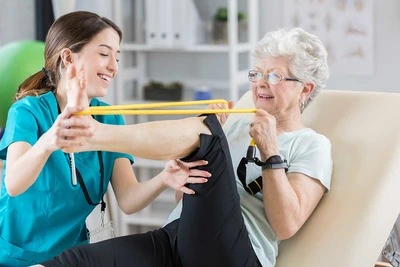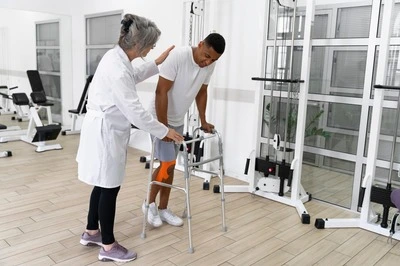
Tyagi's Rehab Center
Best Solution For a Painful Life
You can not only find relief from pain now but also receive guidance for continued good health!
Book Appointment

You can not only find relief from pain now but also receive guidance for continued good health!
Book Appointment
We provide comprehensive physiotherapy services for your wellness journey: From Holistic Pain Management Solutions to Advanced Physiotherapy Techniques, We're Here to Help You Towards Optimal Health and Well-Being.










Founded on September 6th, 2014, Tyagi's Rehab Clinic stands out as one of the best physiotherapy clinics in East Delhi. The visionary behind this esteemed establishment is Dr. Neha Tyagi, an accomplished Orthopedic physiotherapist. The clinic was established with a clear mission: to provide top-notch healthcare and rehabilitation services for individuals dealing with a diverse range of orthopedic, neurological, geriatric, and sports-related issues.

(Founder & Managing Director)
I have dedicated my passion for physiotherapy to creating a haven for healing. Driven by the profound truth of the quote, 'The two most important days in your life are the day you are born and the day you find out why,' our clinic goes beyond treating physical ailments. We focus on helping individuals understand their problems and prevent them in the future, fostering a holistic approach to well-being.
Experience personalized care delivered by our team of dedicated and highly skilled professionals, committed to your well-being.

Founder & Managing Director
BPT, MPT (Orthopedics)
10+ Years Experience

Neuro Physiotherapist
BPT, MPT (Neurology)
10+ Years Experience

Orthopedic Physiotherapist
BPT, MPT (Orthopedics)
2+ Years Experience

HR & Marketing Head
MCA,MBA (HR)
10+ Years Experience
I got in touch with Neha in 2015 when I was operated for Rt shoulder rotator cuff. I got my shoulder fully recovered by her. Unfortunately in Aug 2023, I was operated again, this time for Lt shoulder cuff. Naturally, I had to go to Neha again. Now I am recovered fully. She is expert in painless physiotherapy. She is very polite, cooperative & humble lady. She is more good human being rather than physio. GOD bless her.!
Best physiotherapy experience I have had with Dr. Neha. I have a severe neck pain issue and I travel all the way from South delhi to east delhi for my treatment. She is just an amazing person who understands your pain points and gives the treatment accordingly. I would highly recommend everyone to her.
I got in touch with Dr. Neha last year, when I had significant pain in my back; and was recently treated by her for my neck pain. Would definitely recommend her for any kind of orthopedic treatments.
I have get done physiotherapy of my daughter in law at dr Neha Tyagi clinic.To me she is the best physiotherapist of my life .Her always smiling face treatment cures patients more comfortably.
Dr. Neha tyagi, a lady with magic in hands.Neha you have done a great job in curing me from my back pain n neck pain.Please visit Tyagi's Rehab Centre in case of pain.Guaranteed Results,Thankyou Neha.

20 March 2024
Knee pain is a common ailment that affects millions of people worldwide, often causing discomfort and hindering mobility. While the initial reaction might be to reach for painkillers or contemplate surgery, there exists a highly effective alternative: physiotherapy.
Knee pain is a common ailment that affects millions of people worldwide, often causing
discomfort and hindering mobility. While the initial reaction might be to reach for
painkillers or contemplate surgery, there exists a highly effective alternative:
physiotherapy. In this blog post, we delve into the realm of physiotherapy as a
non-surgical solution for addressing knee pain, exploring its benefits, techniques, and
why it's often the preferred choice for many individuals seeking relief.
Understanding Knee Pain:
Before delving into physiotherapy's role in managing knee pain, it's crucial to
understand the factors contributing to this discomfort. Knee pain can arise from various
sources, including injuries, overuse, arthritis, or underlying medical conditions.
Regardless of the cause, the pain can significantly impact one's quality of life, making
everyday activities challenging and uncomfortable.
The Role of Physiotherapy:
Physiotherapy offers a holistic approach to treating knee pain, focusing on
restoring function, reducing pain, and improving overall mobility without resorting to
surgery. Unlike surgical interventions, which may entail risks and lengthy recovery
periods, physiotherapy provides a non-invasive alternative that addresses the root cause
of the pain.
Key Components of Physiotherapy for Knee Pain:
1. Assessment and Diagnosis: A crucial first step in physiotherapy is a
thorough assessment to identify the underlying cause of knee pain. This may involve
physical examinations, imaging tests, and discussions about the patient's medical
history and lifestyle factors.
2. Exercise Therapy: Exercise plays a central role in physiotherapy for
knee pain. A physiotherapist designs a customized exercise program tailored to the
individual's needs, focusing on strengthening the muscles surrounding the knee,
improving flexibility, and enhancing joint stability. These exercises may include
range-of-motion exercises, strengthening exercises, and functional training to improve
mobility and reduce pain.
3. Manual Therapy: Manual therapy techniques, such as massage, joint
mobilization, and manipulation, are often employed to alleviate pain, improve joint
mobility, and reduce muscle tension. These hands-on techniques can complement exercise
therapy by targeting specific areas of discomfort and promoting relaxation.
4. Electrotherapy Modalities: Electrotherapy modalities, including
ultrasound, electrical stimulation, and laser therapy, may be used to provide pain
relief, reduce inflammation, and promote tissue healing. These non-invasive treatments
can be effective in managing acute and chronic knee pain, particularly when combined
with exercise therapy and manual techniques.
Benefits of Physiotherapy:
1. Non-invasive: Physiotherapy offers a non-surgical approach to
treating knee pain, minimizing the risks associated with invasive procedures.
2. Customized Treatment: Each physiotherapy treatment plan is tailored
to the individual's specific needs, ensuring optimal outcomes and addressing the
underlying causes of pain.
3. Comprehensive Care: Physiotherapy addresses not only the symptoms of
knee pain but also focuses on improving overall function, mobility, and quality of life.
4. Prevention of Recurrence: By addressing muscle imbalances, improving
biomechanics, and enhancing joint stability, physiotherapy helps reduce the risk of
future knee injuries and pain recurrence.
Conclusion:
Physiotherapy stands as a highly effective and non-surgical approach to managing knee
pain, offering personalized treatment plans that address the root causes of discomfort
while promoting healing and recovery. Whether you're recovering from an injury, managing
arthritis, or seeking relief from chronic knee pain, physiotherapy provides a holistic
solution that prioritizes your well-being and restores your ability to move with comfort
and confidence. Don't let knee pain hold you back—explore the benefits of physiotherapy
with Us. Call us and book an appointment with the best physiotherapist near you and take
the first step towards a pain-free lifestyle.

15 April 2024
In today's world, where health and wellness are essential, it's important to separate fact from fantasy when it comes to healthcare practices. Physiotherapy, a field dedicated to restoring movement and function, often finds itself shrouded in misconceptions. Let's delve into some of the myths surrounding physiotherapy.
In today's world, where health and wellness are essential, it's important to separate
fact from fantasy when it comes to healthcare practices. Physiotherapy, a field
dedicated to restoring movement and function, often finds itself shrouded in
misconceptions. Let's delve into some of the myths surrounding physiotherapy and uncover
the truth behind them.
Myth 1: Physiotherapy is Only for Athletes:
One of the most common misconceptions about physiotherapy is that it is exclusively
for athletes recovering from sports injuries. While it's true that athletes often seek
the expertise of physiotherapists to rehabilitate injuries and enhance performance,
physiotherapy is not limited to the realm of sports. People of all ages and activity
levels can benefit from physiotherapy to address a wide range of conditions, including
chronic pain, postural imbalances, and mobility issues.
Myth 2: Physiotherapy is Painful:
Some individuals may avoid seeking physiotherapy due to the misconception that it
involves painful procedures or exercises. However, physiotherapists prioritize patient
comfort and employ techniques tailored to each individual's needs and tolerance levels.
While certain therapeutic exercises or modalities may cause temporary discomfort as
muscles and tissues are being rehabilitated, physiotherapy aims to alleviate pain and
promote healing in the long run.
Myth 3: Physiotherapy is Only for Rehabilitation:
While physiotherapy is indeed highly effective in rehabilitation following injuries
or surgeries, its scope extends far beyond that. Physiotherapists are trained to assess
and treat a variety of musculoskeletal, neurological, and cardiopulmonary conditions,
aiming to improve overall mobility, strength, and function. Whether you're recovering
from an injury or seeking to enhance your physical well-being, physiotherapy offers
personalized treatment plans to suit your goals and needs.
Myth 4: Any Exercise Will Do:
While regular exercise is undoubtedly beneficial for overall health, not all
exercises are suitable for everyone, especially those recovering from injuries or
managing chronic conditions. Physiotherapists undergo extensive training to design
tailored exercise programs that address specific needs and goals while minimizing the
risk of exacerbating existing issues. From targeted strengthening exercises to gentle
stretches and therapeutic techniques, physiotherapy offers a holistic approach to
improving physical function and well-being.
Conclusion:In conclusion, physiotherapy encompasses a broad spectrum of
therapeutic interventions aimed at optimizing movement and function, debunking common
myths along the way. Whether you're seeking rehabilitation, pain relief, or performance
enhancement, consulting a qualified physiotherapist can pave the way towards achieving
your health and wellness goals. Contact the best physiotherapist near you
to take the first step towards a healthier, more active lifestyle today!

26 April 2024
Neck pain is a common ailment that can affect people of all ages and backgrounds. Whether it's from poor posture, injury, or underlying medical conditions, neck pain can impact one's quality of life. Stay tuned to understand the neck pain management in detail.
Neck pain is a common ailment that can affect people of all ages and backgrounds.
Whether it's from poor posture, injury, or underlying medical conditions,
neck pain can be debilitating and impact one's quality of life.
Causes of Neck Pain:
1. Poor Posture: Prolonged periods of sitting or standing with improper
posture can strain the muscles and ligaments in the neck, leading to discomfort and
pain.
2. Muscle Strain: Overexertion, repetitive motions, or sudden movements can
cause strain and inflammation in the neck muscles.
3. Injury: Whiplash from car accidents, falls, or sports injuries can
damage the soft tissues in the neck and result in pain.
4. Degenerative Conditions: Conditions such as osteoarthritis, cervical
spondylosis, and herniated discs can cause gradual wear and tear on the cervical spine,
leading to chronic neck pain.
5. Stress and Tension: Emotional stress and tension can manifest physically
in the form of tightness and stiffness in the neck muscles.
Symptoms of Neck Pain:
1.Stiffness and Reduced Range of Motion: Difficulty turning the head or
bending the neck without pain.
2. Muscle Tension and Knots: Feeling of tightness and knots in the neck
muscles.
3. Sharp or Dull Aches: Pain can range from sharp and stabbing to dull and
achy, and may radiate to the shoulders, arms, or head.
4.Headaches: Tension headaches or migraines may accompany neck pain.
5.Numbness or Tingling:: Sensations of numbness, tingling, or weakness in
the arms or hands may indicate nerve compression in the neck.
Relief Strategies for Neck Pain:
1.Proper Ergonomics: Maintain good posture while sitting, standing, and
using electronic devices to reduce strain on the neck.
2. Stretching and Exercise: Incorporate gentle neck stretches and
strengthening exercises into your daily routine to improve flexibility and muscle
strength.
3. Heat and Cold Therapy: Apply heat packs or cold compresses to the neck
to alleviate pain and reduce inflammation.
4. Manual Therapy: Physical therapy sessions can help relieve muscle
tension and improve mobility in the neck.
5.Stress Management:: Practice relaxation techniques such as deep breathing,
meditation, or yoga to reduce stress and tension in the neck muscles.
Conclusion:Neck pain can significantly impact daily activities and
diminish quality of life if left unaddressed.Take proactive steps to alleviate
discomfort and improve neck health. Consult with a physiotherapist near you for
personalized advice and treatment options if neck pain persists or worsens.
Thank you for considering Tyagi's Rehab Centre for your physiotherapy needs. We're here to assist you on your journey to optimal health and well-being. Whether you're recovering from an injury, managing a chronic condition, or seeking preventive care, our team of experienced physiotherapists is dedicated to providing personalized and compassionate care.
Have a question or need more information? Fill out the contact form below, and we'll get back to you as soon as possible. Your feedback is valuable to us, and we strive to provide prompt and helpful responses to all inquiries .
F-27 B, Basement, Gurdwara Road, Madhu Vihar, Patparganj, Delhi 110092
+91-9015377053
nehatyagiphysio@gmail.com